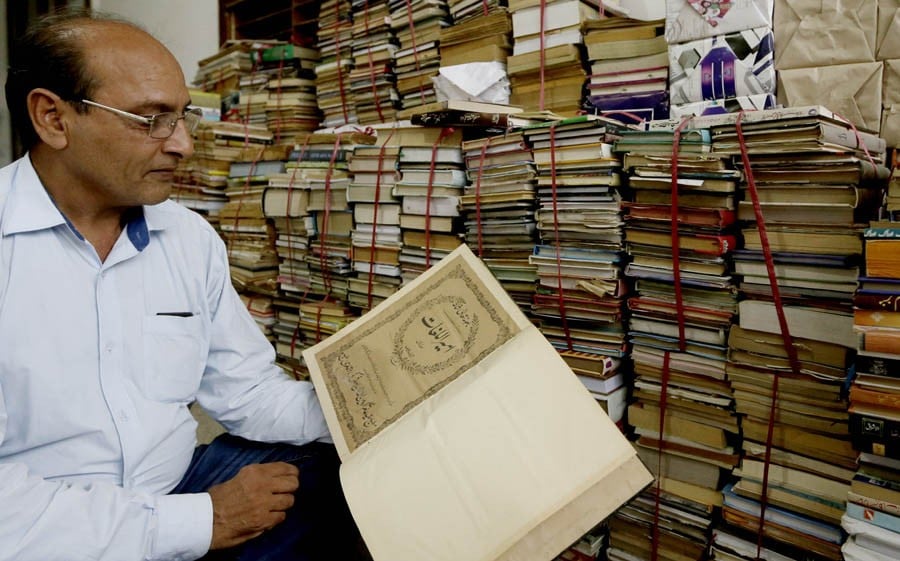
A published poet, die-hard political worker and publisher rolled into one, Ashfaq Saleem has a collection of about 12,000 books, ninety five per cent of which are in Urdu

We all know that there is a paucity of well-stocked government libraries in the country. That is why our researchers have to rely on the treasure of the few book lovers whose collections run into thousands. Students and research scholars frequent these private libraries and get the desired material photocopied.
These private collectors of books are playing an important role in the dissemination of learning and scholarship in a society where very few people are enamoured by books.
Ashraf Saleem is one such private book collector who has maintained a mammoth collection of books in Lahore since 1987. A published poet, die-hard political worker and a publisher rolled into one, he was born in Kallar Syedan near Rawalpindi in 1963. He used to frequent the literary gatherings in Rawalpindi where he got a chance to hobnob with luminaries like Rasheed Amjad, Mansha Yad, Ahmad Daud, Mazharul Islam, Aftab Iqbal Shamim and Nisar Nasik etc.
Naturally, he started composing verse and started collecting old Urdu books and magazines from old book shops in Rawalpindi, Islamabad and Lahore. In the meanwhile, he launched a literary magazine Dastawez in the early 1990s and started a publishing venture under the same banner.
With his meager income, he couldn’t afford to run a publishing house and literary magazine permanently. Despite these hiccups, he still manages to publish a book once in a while and edits his magazine.
But come what may, he never compromised on buying books and literary magazines. Thus, his personal collection of books kept taking more and more space in his small residential flat in Allama Iqbal Town Lahore.
Ashraf Saleem, 54, is working as senior auditor at CMA (Controller Military Accounts) in Lahore. Four years ago, he rented a two room office off Temple road Lahore as books and magazines needed more space for their proper display. His plan is to shift all his books to Temple Road so that students and researchers can access it easily.
He is not too sure about the exact number of books but makes a wild guess. "I have ten to twelve thousand books and more than ninety five per cent are in Urdu. Since Urdu literature is my first and final love so I gathered books and magazines on Urdu poetry, fiction and criticism," he says.
Although he doesn’t remember how many students and research scholars have visited his collection, he does mention that more than thirty M.Phil, and PhD scholars have benefited from it. Apart from a huge cache of literary books, he does maintain the files of many literary magazines such as Alamat, Sareer, Aqdar, Shair (India), Zehn-e-Jadeed (India), Shabkhoon (India), Aaj, Funoon, Nuqoosh, Seep, Nairang-e-Khayal, Auraq, Symbol, Dunyazad, Adbiat, Afkar, Badbaan etc. He also made it a point to hunt for special numbers of famed magazines like Afkar, Nuqoosh, Auraq, especially those that were dedicated to giants like Ghalib, Mir, Iqbal, Faiz, Ahmad Nadeem Qasmi, Josh and many others.
Saleem doesn’t charge a single penny from those who seek his help in arranging material for a specific topic of research. There was a time when he would lend books from his collection but not anymore "because people fail to return the books". Now, they can only photocopy the matter related to their dissertation.
There is no catalogue of his entire collection and the top most priority now is to compile one. "I know it’s an uphill task due to my weak financial background but I will overcome this deficiency pretty soon," he says.
His father, late Abdul Aziz, had to work extremely hard to raise an extended family and Ashraf Saleem intends to rename his library as Abdul Aziz Library. "After my retirement, I will shift it to my ancestral town Kallar Syedan for the benefit of the area. Rawalpindi’s literary ambience nurtured many a struggling writer like me and I owe a huge debt to that area.
"In 1992, I was in dire straits so I sold a truck full of books for five thousand rupees. But I regretted my decision later," he says.
From then on he resolved to buy more books and magazines to make up for the books he sold. Luckily, his grown up son and daughter are not wary of books; rather they help him take care of his prized possessions.